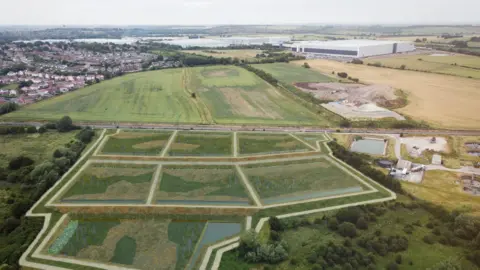Wetland plan to cut down on sewage releases
 Yorkshire Water
Yorkshire WaterYorkshire Water has unveiled plans to cut down the amount of sewage it discharges into a West Yorkshire beck.
The company is to create a wetland at its sewage treatment works in South Elmsall near Wakefield.
The work would help reduce its controversial storm overflow discharges into Frickley Beck, a tributary of the River Don, the company said.
Simon Hudson, the lead project manager, said it would "provide a range of benefits" for the local environment.
Storm overflows are meant to act as relief valves when sewers are at risk of being overwhelmed, such as during heavy downpours.
However, there has been increasing public anger at the levels of sewage being discharged into England's rivers and seas.
In May last year, Yorkshire Water chief executive Nicola Shaw apologised to customers for discharges into the region's rivers.
In a letter to every household, she said the company would invest £180m in reducing sewage leaks from storm overflows.
'Exciting project'
The wetland is designed to treat storm flows during heavy and prolonged rainfall, Yorkshire Water said.
Interconnected ponds will be created across an area the size of five football pitches.
More than 220,000 plants will treat the storm water as it travels downhill through the wetland, taking in and breaking down pollutants and nutrients.
The wastewater being treated would not include solid waste, it said.
The site would take about two years to build.
It is hoped the wetland would also increase biodiversity, attracting wildlife such as bees, breeding birds, amphibians and reptiles.
Mr Hudson said: “This is an exciting project and as we’ve seen with Yorkshire Water’s Clifton wastewater treatment works, these wetlands provide a range of benefits not only the way we treat wastewater, but also for the local environment.
“We want to naturally treat the storm water at South Elmsall, reducing the reliance of energy-heavy treatment processes, providing a sustainable way to remove pollutants and reducing storm overflows into the beck, while creating wildlife diversity and achieving a biodiversity net gain."
Follow BBC Yorkshire on Facebook, X (formerly Twitter) and Instagram. Send your story ideas to [email protected].
